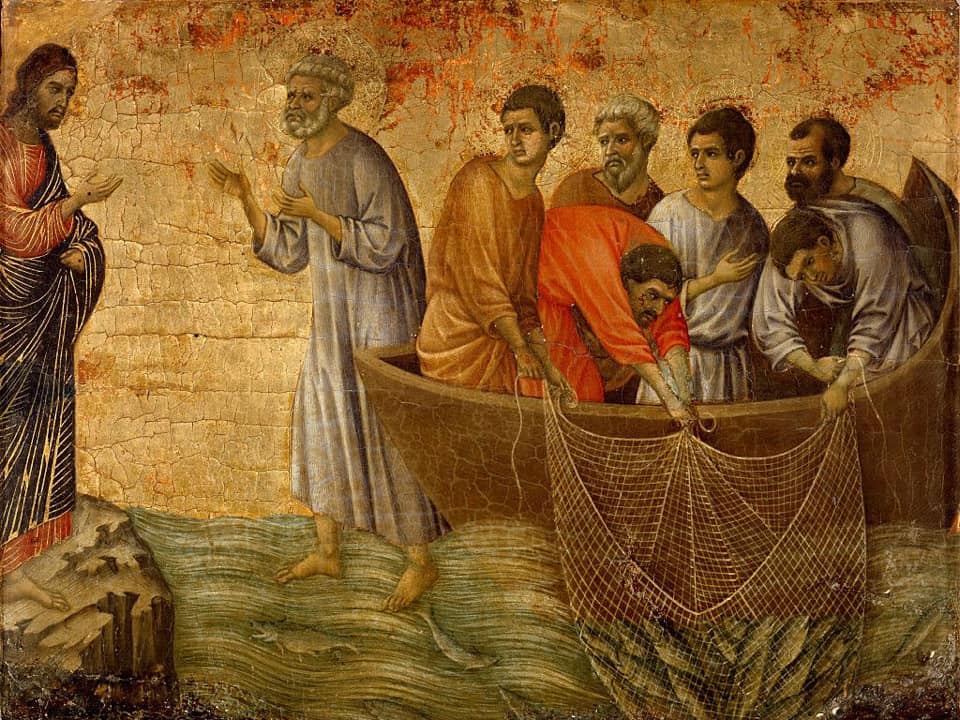 Gospel of 17 April 2020
Gospel of 17 April 2020
Friday within the Octave of Easter
John 21:1-14
Jesus stepped forward, took the bread and gave it to them, and the same with the fish
Jesus showed himself again to the disciples. It was by the Sea of Tiberias, and it happened like this: Simon Peter, Thomas called the Twin, Nathanael from Cana in Galilee, the sons of Zebedee and two more of his disciples were together. Simon Peter said, ‘I’m going fishing.’ They replied, ‘We’ll come with you.’ They went out and got into the boat but caught nothing that night.
It was light by now and there stood Jesus on the shore, though the disciples did not realise that it was Jesus. Jesus called out, ‘Have you caught anything, friends?’ And when they answered, ‘No’, he said, ‘Throw the net out to starboard and you’ll find something.’ So they dropped the net, and there were so many fish that they could not haul it in. The disciple Jesus loved said to Peter, ‘It is the Lord.’ At these words ‘It is the Lord’, Simon Peter, who had practically nothing on, wrapped his cloak round him and jumped into the water. The other disciples came on in the boat, towing the net and the fish; they were only about a hundred yards from land.
As soon as they came ashore they saw that there was some bread there, and a charcoal fire with fish cooking on it. Jesus said, ‘Bring some of the fish you have just caught.’ Simon Peter went aboard and dragged the net to the shore, full of big fish, one hundred and fifty-three of them; and in spite of there being so many the net was not broken. Jesus said to them, ‘Come and have breakfast.’ None of the disciples was bold enough to ask, ‘Who are you?’; they knew quite well it was the Lord. Jesus then stepped forward, took the bread and gave it to them, and the same with the fish. This was the third time that Jesus showed himself to the disciples after rising from the dead.
Reflexion
It’s strange but also true that the most painful memories are usually the ones that stick, no matter how much you try to forget them. It's so hard to forget pain, but it's even harder to remember sweetness. We have no scar to show for happiness.
In today’s gospel, we see another encounter between the resurrected Lord and His disciples. Right at the very centre of today’s lengthy gospel story is the story of Jesus sitting on the shore cooking and warming Himself beside a charcoal fire. Even if you are not a student of Biblical Greek, you may be interested to note that word used for that charcoal fire, anthrakia, only appears here and in another place in John’s gospel; John 18:18. This other scene takes place in the courtyard of the High Priest, precisely at the point where St Peter denied Jesus.
The fire evokes once again the scene of denial in Chapter 18, the scene where Peter once stood by the fire and said, “I am not his disciple.” The past comes rushing back. Perhaps we can even imagine hearing the cock crowing. On the one hand, we see a Peter who is courageous and bold -- he wants to be near his Lord in His hour of need. But Peter is terrified, also. He is in danger and knows it. And as he sits near the fire, Peter's courage gives way to fear.
So this dramatic scene turns out to be a story of memory and restoration. Confronting the Risen Jesus is not easy, especially for those who have betrayed Him. Standing in the light of the charcoal fire, Peter must first remember his failure and then own it. For Peter to move forward, his past must be assimilated with the present in order to prepare him for the future.
Our humanity is defined and enhanced by our capacity to form and then transmit personal memories. I've learned over the years that guilt is one of the hardest things to bear. That may be the reason why we deliberately choose to suppress memories. By forgetting, we attempt to banish the guilt that comes with that memory to the dark recesses of the mind. But guilt itself cannot help us conquer sin. Guilt is the burglar alarm of our conscience, and while it can ring incessantly, it cannot heal. Only the love of Jesus for us and our love for Jesus can heal us. This is what St John meant when he said, “There is no fear in love. But perfect love drives out fear …” (1 John 4:18)
And so, we are invited to gaze deeply into the flames – we see in the flames not only a reflexion of our worst failures but also the future path of our redemption. Though tempted to look away, we must return our gaze to the fire that burns brightly before us. The fire may reveal the dross hidden in our hearts, but the fire also dispels the darkness of the night. In the burning flames of God’s love, we recognise both the wounds caused by our sinfulness, and the healing offered by Christ. As we look into the flames, we see Jesus looking back at us. In the flames, in the memories of our past faults and failures, we see Jesus forgiving our offenses, taking our penalty, healing our wounded souls, and restoring us to communion with God. In the flames, we will discover our healing at the hands of Jesus.
